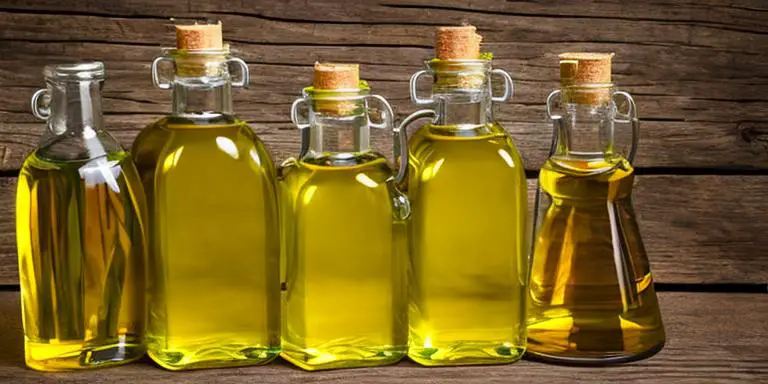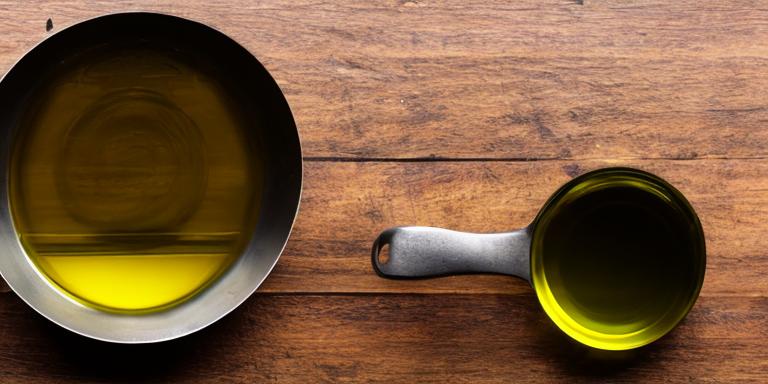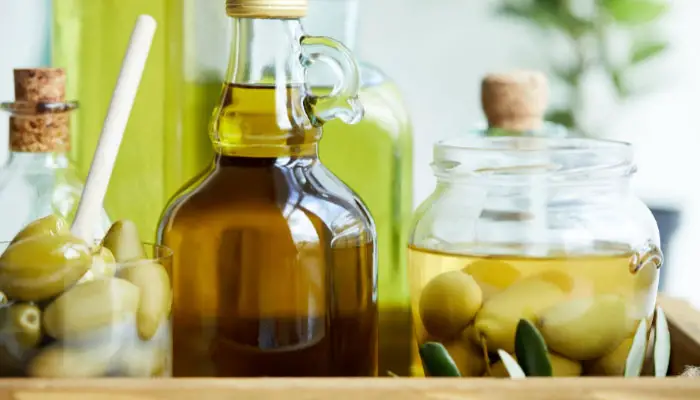This is a question discussed for decades: is olive oil the same as vegetable oil? Unfortunately, there isn’t an easy answer. The truth is, they are both oils and have many of the same properties. So, what’s the difference between them? Well, you need to know more about both types of oils before making any conclusions.
This article will go over both olive and vegetable oils to learn about their similarities and differences. This will help you understand how olive oil is similar to vegetable oil and whether you can mix the two types of oils.
What is olive oil?

We cannot clearly differentiate olive oil from vegetable oil if we do not first define the two types of oil.
Olive oil is produced from an olive plant fruit. It is most commonly pressed in an industrial machine or cold-pressed and then bottled with no additional treatment. Olive trees are primarily grown in Spain, Italy, Greece, Tunisia, Turkey, California, and Australia.
Olive oil is used in cooking, medicine, and cosmetics. It has a unique flavor that makes it desirable for food preparation in such ways as dressing salads.
What is vegetable oil?

Vegetable oil is not the same as olive oil. It is an oil that comes from the fruit of a plant. It’s made by extracting oil from various seeds, nuts, fruits, and vegetables using a solvent. Vegetable oil is made from plants such as corn, soybeans, and cottonseed, among others. The oil is then used in cooking and to make products such as margarine and shortening.
Due to the nature of the extraction and processing of vegetable oil, the final product is often neutral-tasting and colorless. This makes it a popular choice for frying food and baking. One setback, however, is that the high level of processing rids it off essential vitamins and minerals.
Difference between olive oil and vegetable oil?
Olive oil is a healthier alternative to vegetable oil. This preference stems from the difference between these two products.
Source of the oil
The main difference between olive oil and vegetable oil is that olive oil comes from fruit- olive, while the latter derives from seeds, nuts, or vegetables. Olive oil has a distinct taste and a richer, more colorful hue than vegetable oil.
Heath benefits
Olive oil is also healthier for you as it contains high levels of monounsaturated fats. It is full of antioxidants and anti-inflammatory agents that help fight against the free radicals responsible for causing cancer, cardiovascular disease, and arthritis.
On the other hand, vegetable oil is a blend of many plant-based oils that don’t have many health benefits. The low nutritional value results from the extraction and processing procedures, which destroy minerals and vitamins in the liquid fat.
Smoke points
Another difference between olive oil and vegetable oil is their smoke points, which refers to how hot they can be before they start to smoke and produce harmful carcinogens. Vegetable oil can reach a smoking point of 400 degrees Fahrenheit, while olive oil is considerably lower at 390 degrees Fahrenheit. This is because vegetable oil has a more refined molecular structure, allowing it to withstand heat better than olive oil.
Is olive oil healthier than vegetable oil?
The nutritional advantages are the most important distinction between these two types of oils. Olive oil has rich monounsaturated fats, whereas vegetable oil includes less beneficial fat. Olive oil contains moderate levels of saturated fats, while vegetable oil has high amounts that increase the risk for heart disease and other forms of cardiovascular problems.
Olive oil is also not as processed as vegetable oil. This means that olive oil is able to retain some essential nutritional value even after processing. Olive oil has minerals and vitamins, in addition to antioxidants, which are lacking in vegetable oil.
There is another significant reason why olive oil may be a healthier option than vegetable oil- there are omega-6 fatty acids in the latter. Omega-6 fatty acids are not good for your body. They can cause inflammation. This means that even if you’re locked to one option, i.e., vegetable oil, you should use it sparingly. If you can, buy vegetable oil that is organic and not hydrogenated.
Olive oil comes packed with various benefits, including:
Anti-inflammatory properties
Olive oil contains oleic acid (fatty acid), which is an omega -3 fatty acid. In conjunction with antioxidants present in it, olive oil has even neared the effectiveness of ibuprofen, a drug synonymous with anti-inflammation.
Benefits the cardiovascular health
Olive oil slows the oxidation of low-density lipoprotein (LDL), which prevents plaque buildup. Without the accumulation of fats in the veins, love oil promotes the functioning of the endothelium.
This is a huge benefit for anyone at risk or suffering from cardiovascular diseases such as hypertension and high cholesterol levels.
Olive oil has also been observed to lower blood pressure and improve clotting.
Fights against cancer.
The antioxidants present in olive oil can help fight off free radicals that damage cell membranes and promote the growth of tumors. There is also a compound called squalene, which has been found to prevent breast cancer cells from multiplying.
Helps against Alzheimer’s disease
People suffering from Alzheimer’s disease are usually found to have accumulated beta-amyloid plaque in the brain. This plaque can be dissolved by olive oil, according to studies on mice. This is just one way olive oil promises to protect against cognitive degeneration.
How is olive oil the same as vegetable oil?
Olive oil and vegetable oils are both plant-derived products that have been used as cooking oils for eons. Both are good sources of unsaturated fats and can be consumed in moderation to reap their numerous health benefits.
Both olive oil and vegetable oil have high smoke points, i.e., they do not start smoking until heated well past 390°F. This means that they are both safe for cooking at high temperatures and can be used for similar cooking purposes.
In most situations, they are interchangeable. However, olive oil generally has a stronger taste than vegetable oil, so one may need to use less of the latter if not making something flavored or savory.
Both of these oils are high in unsaturated fatty acids, the healthy choice being olive oil.
Olive oil and vegetable oil smoke points
The smoke point is the temperature at which oil starts to smoke. It’s best not to cook with oil if it has gone past this temperature. Olive oil has a medium-high smoke point of around 390°F, while most vegetable oils have slightly higher smoke points in the range of 400°F to 410 °F.
Vegetable oils are usually processed to remove trans-fats, which also reduces the smoke point. However, some vegetable oil varieties such as avocado (510 -520) and macadamia nut oils (410) have high enough smoke points to be safely used for deep frying or sautéing at high temperatures.
Canola oil (refined) has a smoke point of about 400°F.
Coconut oil has a smoke point over 400°F depending on the refining method used, while palm kernel oil can be safely heated to around 450 – 470 º F.
Is olive oil considered a vegetable oil?
No, it is not. Olive oil comes from the fruit of Olea Europaea and, in scientific terms, falls under the category of “fruit oils”. While there are some similarities between these two categories (e.g., both being plant-derived), they actually belong to different families entirely.
Vegetable oil is a term that describes oils that come from plants and have been processed to some extent. The main difference between the two is their chemical makeup, as reflected by their names—olive oil comes from olives. In contrast, vegetable oil usually refers to soy, corn, or canola oils, that have been extracted from seeds, nuts, or kernels.
Vegetable oils are usually processed with chemicals and high heat, damaging their delicate fatty acid profiles, unlike olive oil which is unrefined mainly.
One exception is avocado oil that falls under the fruit-vegetable category since it comes from the pulp of an actual fruit instead of a seed or kernel. Avocado oil has some similarities to olive oil regarding its health benefits, but it still has the highest smoke point, higher than all vegetable oils.
Can you mix olive oil and vegetable oil?
Since both oils have high smoke points, it is possible to mix them when cooking at high temperatures, and they will not cause the food to burn or turn black.
Whether you can mix the two oils entirely depends on what you intend to do with the resulting mixture. If you want to use them for baking, then the answer is yes—you can mix olive oil and vegetable oil up to a ratio of 1:1.
However, if your aim is to use both oils in frying where they will be reused several times, be warned that olive oil should not be reused more than five times. This is unlike vegetable oil which can be reused more than five times.
Finally, you should never try mixing virgin or extra virgin olive oil with other cooking oils. This will reduce the smoke point and affect the health benefits of virgin or extra virgin olive oil.
Can you use olive oil instead of vegetable oil for frying?

You can use olive oil in frying. It has a low smoke point of around 375 0 F and is best used for searing or shallow frying. The oil might produce some smoke when searing with it, but that doesn’t mean that the piece of fish fillet you searing will kill you.
Olive oil will perfectly crisp your fried egg and pork chops without overwhelming their flavor. It just adds some subtle, neutral flavor. Deep frying in olive oil is quite allowed and gives your food a great taste.
However, extra virgin oil is quite pricey, and the amount needed for frying will be quite a lot, especially if you have guests. We all look into saving a few bucks, and cutting on using olive oil to deep fry is one way to make your pockets fuller.
Are vegetable oil and olive oil interchangeable?
Absolutely!
Vegetable and olive oil are quite the same thing, but with very few differences. While vegetable oils mainly come from seeds plants and olive oil from the olive fruit, you can use these two oils to replace the other. They both remain liquid at room temperature, have pretty similar smoking points, are low in saturated fats, making them a great healthy oil.
What distinguishes them is:
- Taste: Olive oil has a more pronounced fruity flavor that is best in salads, pizza, hummus, and dips. Vegetable oil may include different tastes depending on the plant oil it’s made from.
- Source: Olive oil is produced through pressing olives, whereas vegetable oil mixes other oils such as canola and sunflower.
- Fats: Extra virgin olive oil contains a lot of good fats. It has more monounsaturated fats than vegetable oil.
- Processing: Vegetables and olive oil undergo heating and treatment to remove impurities in them. Processing different vegetables take a lot more effort than processing olive oil alone.
- Nutrition: Olive and vegetable fats contain no carbs or protein. Olive oil is rich in vitamin K and E, while vegetable oil contains traces of macronutrients.
- Which oil benefits your health? Is it olive oil or vegetable oil?
Olive and vegetable oils can both have affect your health. However, olive oil wins over vegetable oil. Olive oil lowers the risk of cardiovascular diseases. It is not so clear on the impact of vegetable oil on the heart’s health. Olive oil also contains some anti-cancer properties that help fight cancer, while there has been no association between vegetable oil and cancer.
Frequently Asked Questions
Is vegetable oil the same as olive oil for baking?
Vegetable oils are made from a mixture of different oils like canola, soybean, and sunflower, while olive oil is made from pressing or crushing olive fruits. If you are baking and just found out you run out of vegetable oil, olive oil can fill the gap.
However, due to its flavor, you should expect it to tamper with the cake’s flavor. Reaching out for a bottle of refined olive oil could be better because of its mild flavor. However, some cake recipes might call for using olive oil, and if so, it is best to stick to what the recipe calls for. All in all, both the vegetable oil and olive oils moisten your cake correctly, so there’s the least chance of ending up with a dry cake.
Is vegetable oil the same as cooking oil?
No!
Vegetable oils come from pressed or crushed seeds and plants. The famous vegetables used in oil extraction are soybeans, sunflower, corn, and safflower. Cooking oil, on the other hand, is extracted from nuts, wheat, and grains.
Vegetable oil is used in baking, making salads, margarine, and other dozen uses. On the other hand, cooking oil is used specifically for cooking. Examples of cooking oil include coconut oil, olive oil, and vegetable oil.
Conclusion
The question of whether olive oil is the same as vegetable oil is now answered. Olive oil is not the same as vegetable oil, but they are both healthy alternatives to other types of cooking oils. Olive oil has a higher smoke point than most varieties of vegetable oil, and it contains antioxidants that can boost your health. On the other hand, vegetable oil does have high smoke points compared to many seed oils. This makes it suitable for deep frying and sautéing at high temperatures.

